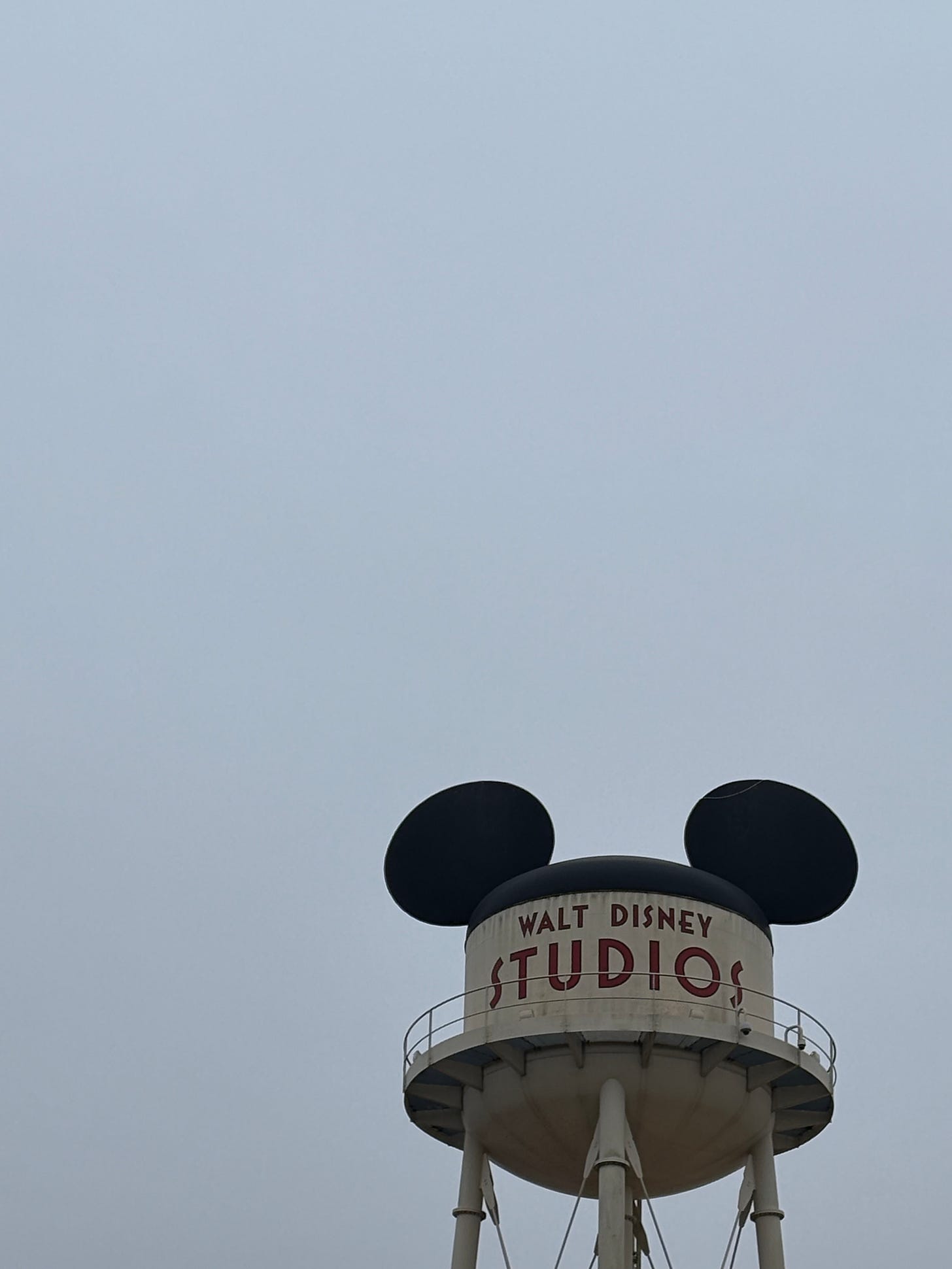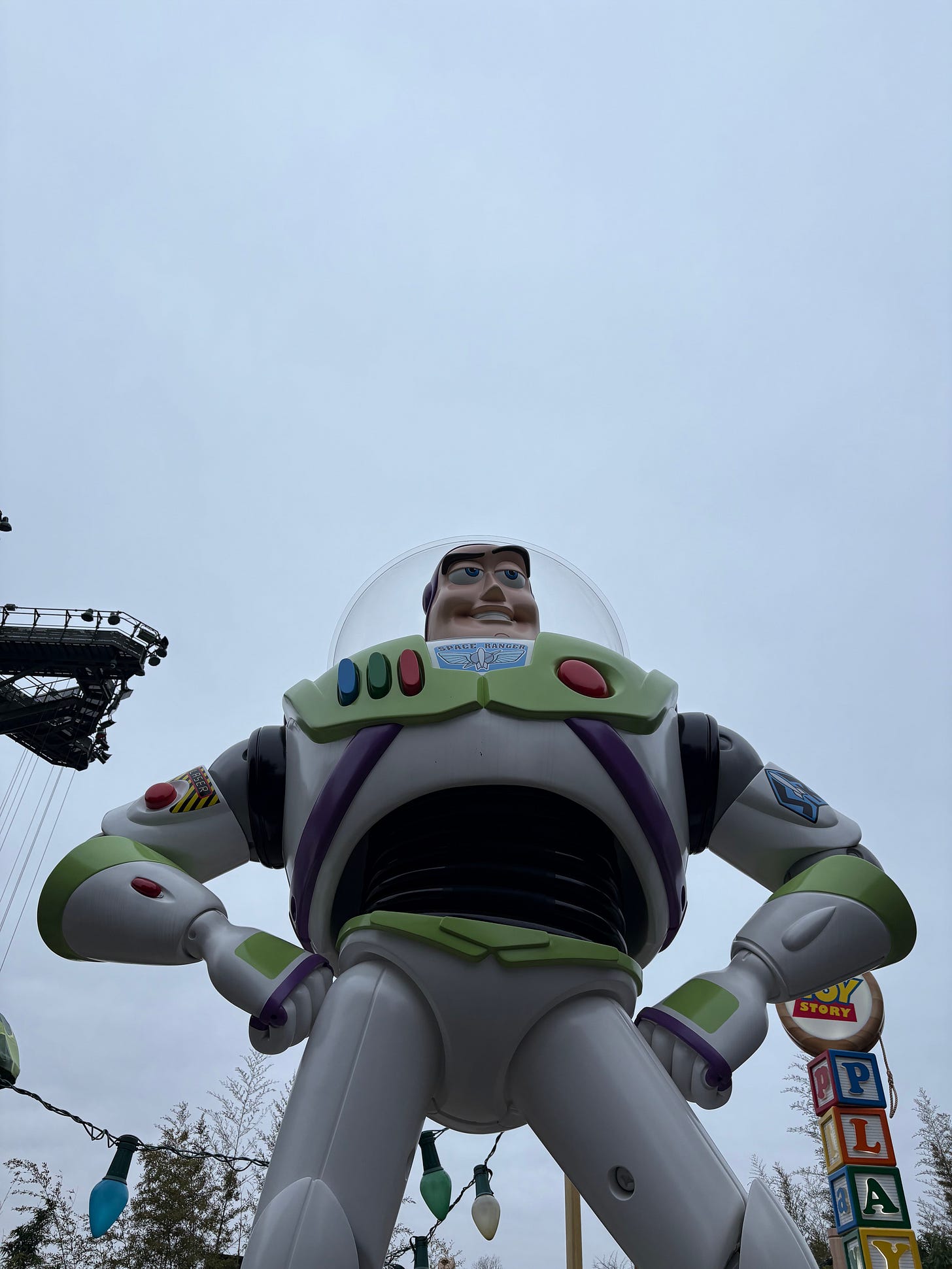book reviews from Disneyland
seriously good books I've read this month / I'm in Disneyland, whaaaaaaat!
Hello friends,
A few quick announcements before we kick off with this weeks post.
Firstly Dates for your diary - The Element Sessions WOOD will be going live from next week.
Friday 21st - DEEP DIVE EMAIL
Tuesday 25th - 9:45-10:45am LIVE CALL
Friday 28th - WOOD PODCAST Interview
And secondly, if you’d like to access a short recording for the Sitting in the Dark self-led sessions - head here.
I’m writing this to you from the Dream Castle Hotel, in DisneyLand, Paris. My daughter is performing on one of the Disney stages later this morning, excitement levels are off the charts. It’s an odd place, if I’m honest. Not really sure what to make of it quite yet! I’m grabbing an hour or two while they do their dress rehearsals to write to you, then it’s off for their show followed by an afternoon of Disney-tastic action … wish me luck !
This week I want to share with you some ideas that surfaced from the books I’ve read over the last few weeks. All memoir, or non-fiction, many from writers here on Substack. I thoroughly enjoy and take so much from the posts / newsletters I read on
, but I’m also aware that many of us are here because we write, or aspire to write, books, not only posts. I’ve written before about how it is a little like the difference between an artist’s sketch and a sculpture. Both can be works of art, both are beautiful, but there is a difference between the two forms still.So this month I chose to spend more of my reading time on the longer form work of some of the writers here on this platform. Here are some of the thoughts that surfaced as I read. I go a little all over the place with this post friends, but I am in Disneyland, and it is bonkers, so this is as good as it gets !
‘I spoke of the need for clarity, that writing well in my opinion meant facing up to things with courage, thinking clearly and deeply, while allowing oneself the ability to fall into reverie and yet also being alert to all the meaningful associations made’
Lily Dunn, Sins of my Father, p. 232
Lily’s words, indeed her whole attentive, fiercely honest and questioning book has got me thinking a lot about why we write about our own lives. Is it to understand? To unravel, to mark a moment, to say this happened, to examine why? To not look away? To shed something, to own something? To hand something back, to say I was here? Is it therapy? No, although writing can undoubtedly be therapeutic. Is it healing? It can be. Is it hard, hard, hard to do – to face things with courage, without flinching, or if we do flinch, to show the flinch on the page? Yes. Yes. Yes.
I’m at a stage in my writing of my memoir where it is very important that I do not look away. That I think clearly and deeply. That I examine hard truths. The hardest part is that I don’t live my life in a bubble, hermetically sealed. My life touches off the lives of others. Has been shaped by others, my actions have impacted them and they, me. How do I write others onto the page, especially those who may not want to be there, or are nervous about what they will read? I am not telling their stories, but their lives are part of mine. How do I stay true to what I feel compelled to do – to write this book, tell this story – without unnecessarily hurting those I love?
, in an interview with about her own writing practice speaks about how looking at a topic is like holding a gemstone up to the light and turning it round to view it at many different angles. This has stayed with me. Our writing our story is not perhaps about telling some ultimate truth, because – is there ever? – but about saying look at this memory, this idea, this experience from here. But also in this light, and in this. That is how a rich three dimensional world is formed. (I think of how my phone asks me for my thumb print from 10 different angles before it accepts it as my unlock code.)When she talked about ox-bow lakes it helped me to understand that arching feeling of relief when the school day was over and I could go home; when I sat at the back of geography class, with no friends, missing my mum even during the few hours of a short school day, I knew exactly how a flood plain felt too. (p 1.02)
Clover Stroud, The Giant on the Skyline
I’m currently about a third of the way through
’s evocative memoir about belonging and home. It explores how a landscape and a community can form us. It is also about love and relationships, and I am really appreciating how openly and truthfully Clover explores the competing devotions and emotions that being a mother and a partner inevitably involves. Travelling to DisneyLand has been an interesting time to read the book, which is exploring the idea of a life lived in two very different places - it has made me more acutely aware of my own deep relationship to place. It has been a long time since I’ve flown and travelled through busy places, most of my days, like Clover’s in the book, are filled with mucky fields, traffic jams caused by sheep, or cows, the leg of a deer found abandoned on the grass. How strange to see all these people, in all their clothes, with all their bags and lives and places to go. How crazy it is that we have evolved the way we have as humans, to travel in these tin cans in the air, to buy all this stuff, to eat all this food, to entertain ourselves in these strange, complicated ways. Both myself and my daughter have had moments during the day yesterday when all the people and noise were just too much, and I’ve realised just how at home I’ve become in the place I live.Circling back to ’s book - near the beginning of it she asks the question, regarding her father, of at what point our background, our upbringing, our trauma becomes something we have to take responsibility for, instead of it being an excuse for how we navigate our lives. Lily describes with great compassion her father’s being sent to boarding school at the age of seven and the traumatic impact that the severing of his home life, and the abuse he most likely suffered at the school had on him for the rest of his life. It made for hard reading for me, combining the knowledge that my own father was sent to boarding school at six, and looking at my own seven year old son now and imagining him being sent away. But, she asks, can that excuse everything that ensues? Maybe writing our stories in memoir is a way of also taking responsibility for our own lives, taking them back?
This feels very pertinent to another book I read this January, not by a Substack writer, but by the remarkable writer Katriona O’Sullivan. I met Katriona on the writing residency I was on at the start of the year, and was so drawn to her generous, warm, honest manner, as well as curious about the remarkable life she hinted at in conversations we’d had. Her book is titled Poor and tells of a hugely challenging, neglected childhood, with both her parents addicts who failed so often to care for her the way she deserved. There is so much about this book that blew me away – how Katriona described the unquenchable spark within her as a little girl, despite the hardest of circumstances, how teachers and her love of books were a thread of hope always, how being poor affects so many aspects of who you believe you can be, and who society tells you you can be, how she looked at her life and said ‘I deserve more’ and despite, and sometime because of everything, found a route to a better life (she is now a professor in the department of Psychology at Maynooth University). This was a raw, honest, sometimes brutal, but ultimately massively inspiring read that has in the way of all great books shifted the lens through which I view the world.
Whilst away on the writers residence I also read
fascinating short work Threatening Women which sets out to answer the question why it was that Ireland incarcerated more women and children in institutions in the twentieth century than any other country in the world? The analysis she gives, backed up by numerous research papers and studies tracks Ireland’s treatment of and growing fear of women from medieval times forward. I underlined so much of this book, turned over so many of the pages. The incarceration of women and children in Ireland reached its zenith in the Mother and Baby Homes of the mid to late twentieth century, the last of which only closed here in Ireland in the 1990’s. The impact of the treatment of women and children in these homes is so huge; a direct line can be drawn between what Belinda is writing about and Katriona O’Sullivan’s childhood in Poor– Katriona’s father spent the first six years of his life in a Mother and Baby Home, what happened to him there was never known, but the impact of that abandonment and possible abuse ricocheted through his life, leading in part to his addiction and his inability to care for his children the way they deserved.I was also very drawn to how
describes the ways in which the Irish landscape and the Gaelic-Irish woman were often seen in the same light – as wild, unruly, in need of taming. It brought back memories of my own abandoned Masters thesis on representations of deviant bodies on stage … gosh I’d love to return to that research now! I think of this relationship of body and landscape as I read write:
The Ridgeway was almost the first place I took Pete, when we were falling in love with each other, and I wanted to show him the curves of countryside which mattered as much to me as the way he touched the shape of my body. (p.111)
The question I am sitting with now, and will be for some time I think is this:
What is it about women’s bodies and the land that feels so intertwined?
There are so many brilliant writers here on Substack who have written great books about a lot of these ideas - on belonging, home, trying to understand our parent(s), connection to place, trauma and its aftershocks and so much more. Some of them include
and . Do check out their work, buy their books. I’m also really looking forward to diving into ’s Milk in the coming weeks, too.My pile of TBR is getting dangerously high … tell me … what are you reading at the moment?








Thank you, Layla, for adding to my list:)
I’m just finishing up The Signature of All Things by Liz Gilbert. Next up is Soul Boom by Rainn Wilson and The Salt Path by Raynor Winn.
To avoid being crushed by the avalanche of books on my nightstand, they are piled on the floor. Death by book avalanche doesn’t seem to be a terrible fate…
Thank you so much for including my wee book in this list Layla. I love to think of you underlining it and to know which parts really struck a chord!